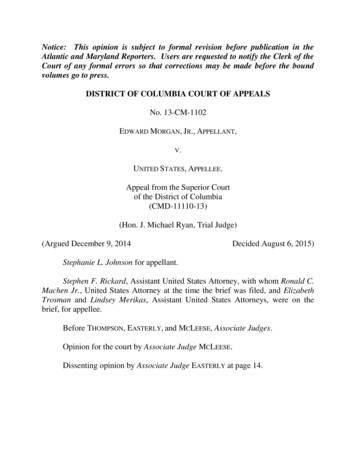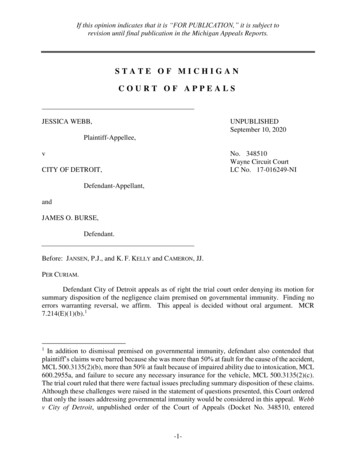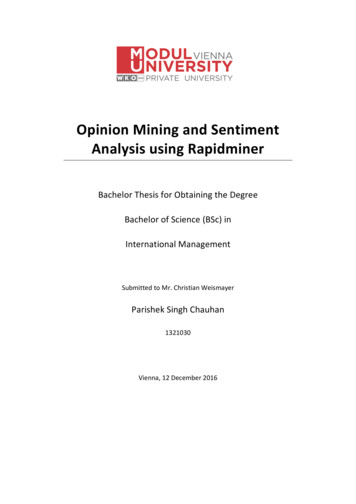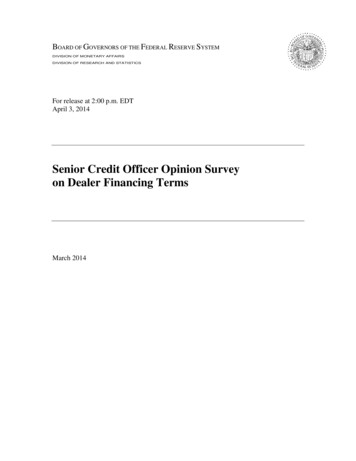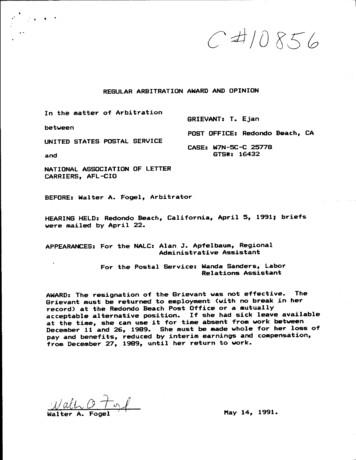
Transcription
This opinion will be unpublished andmay not be cited except as provided byMinn. Stat. § 480A. 08, subd. 3 (2012).STATE OF MINNESOTAIN COURT OF APPEALSA14-0487Chris Gregerson,Appellant,vs.Hennepin County and Tracey Martin,Respondents.Filed October 6, 2014AffirmedRodenberg, JudgeHennepin County District CourtFile No. 27-CV-13-10910Chris Gregerson, New Richmond, Wisconsin (prose appellant)Michael 0. Freeman, Hennepin County Attorney, Toni A. Beitz, Assistant CountyAttorney, Minneapolis, Minnesota (for respondents)Considered and decided by Schellhas, Presiding Judge; Worke, Judge; andRodenberg, Judge.UNPUBLISHED OPINIONRODENBERG, JudgeAppellant Chris Gregerson challenges the district court's grant of summaryjudgment in favor of respondents Hennepin County and Tracey Martin and its denial ofappellant's request to access data under the Minnesota Government Data Practices Act(MGDPA). We affirm.
FACTS 1Appellant maintains a website of stock images that can be licensed or purchased asprints. In 2005, appellant discovered that Vilana Financial, Inc. had used one of hisphotographs without permission. Appellant sued Vilana Financial, Vilana Realty, Inc.,and the companies' principal shareholder, Andrew Vilenchik, for copyright infringement.In 2008, the federal district court awarded appellant 19,462 in actual and statutorydamages for the unauthorized use of his photographs. Gregerson v. Vilana Financial,Inc., No. 06-1164,2008 WL 451060, at *10 (D. Minn. Feb. 15, 2008).In 2009, appellant sued Vilana Financial, Vilenchik, Vladimir Kazaryan (a Vilanaemployee), and their attorneys and law firms, alleging malicious prosecution, abuse ofprocess, and conspiracy. Hoping to uncover evidence to support his claims of maliciousprosecution against attorney Boris Parker, appellant settled his claims with Vilana andVilenchik, in exchange for Vilenchik's promises to waive his attorney-client privilegeand to turn over correspondence with Parker.appellant's remaining claims.The district court later dismissedWe affirmed the dismissal of appellant's claims.Gregerson v. Vilana Financial, Inc., No. A10-0863, 2010 WL 4451820, at *1 (Minn.App. Nov. 9, 2010), review denied (Minn. Jan. 26, 2011).In 2010, the Crystal police department obtained two search warrants to investigatealleged criminal activities of Vilenchik and the Vilana corporations unrelated toappellant's claims. The first search warrant was issued on probable cause to believe that1We provide a detailed factual history leading up to the operative facts giving rise toappellant's claims to enable the reader to understand the context of appellant's claims inthis case.2
Vilana's premises were being used as an unlicensed massage parlor and authorized asearch for massage therapy equipment, advertising materials related to massage therapy,and "computers and peripherals used to place online advertising, produce advertisingmaterials or schedule client appointments." The second search warrant was issued onprobable cause to believe that Vilenchik had engaged in theft by swindle in the sale of afake diamond and authorized a search for financial and other records relating to diamondsand "computers and peripherals used to maintain financial transaction records of thediamond sale or used in the production of fictitious . papers."When executing the two search warrants, Crystal police officers seized severalcomputers. A Hennepin County forensic computer examiner "imaged the hard drives ofsixteen of the seized computers so that [he] could conduct forensic analysis of theircontents, within the parameters specified in the search warrants. " 2 The examiner thenused 35 key words provided to him by Crystal police officers to determine whether thehard drives contained evidence relevant to the theft-by-swindle and unlicensed-massageparlor investigations.The key words did not include "Christopher Gregerson, BorisParker, Vladimir Kazaryan, Michael Walker, Michael Zubitskiy, McShane, or the topics'malicious prosecution,' or copyright."The examiner downloaded the results of hisanalysis onto a disc and gave it to the Crystal police department.In April 2011, appellant sent a subpoena to the Hennepin County Sheriff's Office(HCSO) requesting copies of the hard drives. In response, Assistant Hennepin County2Complete copies of the hard drives were made for examination and remain in evidencestorage at the Hennepin County Sheriff's Office. The seized hard drives were thenreturned to their owners.3
Attorney Toni Beitz informed appellant that the subpoena was improper and that theHCSO would not release a copy of the hard drives without a court order. Appellant theninformed Beitz that he "wished the HCSO to deem [his] subpoena to be a requestpursuant to the MGDPA." Beitz denied appellant's request to access the hard-driveimages because the Crystal police department's criminal investigation was "still formallynot closed" and "all data is technically still confidential." But Beitz also explained thatthe HCSO would not provide appellant with the hard-drive images even after theinvestigation was final.In June 2012, appellant contacted Beitz to ask whether the criminal investigationwas complete and when the statute of limitations would expire. He narrowed his requestto any documents regarding Boris Parker, Morgan Smith, or himself, including e-mailsand recorded conversations between Vilenchik and Parker. Beitz responded that "thecriminal investigation still has not been officially closed" and that the statute oflimitations was "three years or longer." Beitz also advised appellant to address anyfuture requests to the Crystal police department or to the HCSO's responsible authority,respondent Major Tracey Martin.In September, appellant contacted Martin to request access to "any documents(email, letters, etc.) contained on the seized hard drives which are to, from, or mentionBoris Parker" and "any audio recordings tha[t] include the voice of, or mention, BorisParker." Appellant also requested any documents or recordings that mentioned himself,Kazaryan, Walker, Zubitskiy, McShane, malicious prosecution, or copyright.Martindenied appellant's request for data and told appellant to address all future inquiries to the4
City of Crystal because the HCSO "will not release any data without authorization fromthe City of Crystal."In December, appellant made another request for data and requested "to beinformed if [he was] the subject of any of the data on the hard drive images identified in[his] previous letter." Martin again denied appellant's request.Appellant then sued respondents, alleging that "[he] is entitled to access orreceive, on an expedited basis, documents [he] requested from [respondents] under theMGDPA." Appellant requested the district court to (1) compel compliance with theMGDPA, (2) grant declaratory relief, (3) authorize the disclosure of investigative data,and (4) order that he "is entitled to have access to the data he requested in his MGDP Arequests" and compel respondents "to provide [him] with access to the requested data."Respondents moved for summary judgment, arguing that the district court couldnot compel compliance with the MGDP A because appellant was seeking neithergovernment data nor investigative data under the MGDP A. Respondents also argued thatthe requested information was protected under the United States and MinnesotaConstitutions. Appellant also moved for summary judgment, arguing that he was entitledunder the MGDPA to the data on the imaged hard drives that concerned him and hisdispute with Vilana and its affiliates. The parties agreed that there were no genuine andmaterial factual disputes.The district court granted respondents' motion for summary judgment and deniedappellant's motion. The district court concluded that "the data requested by [appellantdo] not constitute 'government data' under the MGDPA," nor were they "criminal5
investigative data under the MGDPA." Moreover, "a warrantless search of the data bythe HCSO, as requested by [appellant], would violate the Fourth Amendment and theMinnesota Constitution." As additional bases for denying appellant's requested relief,the district court noted that appellant failed to join Vilenchik as a party and failed todemonstrate a bona fide legal interest because appellant was not entitled to the data. Thisappeal followed.DECISIONTheMGDPAregulates the collection, creation, storage, maintenance,dissemination, and access to government data in governmententities. It establishes a presumption that government dataare public and are accessible by the public for both inspectionand copying unless there is federal law, a state statute, or atemporary classification of data that provides that certain dataare not public.Minn. Stat. § 13.01, subd. 3 (2012). "The purpose of the MGDPA is to reconcile therights of data subjects to protect personal information from indiscriminate disclosure withthe right of the public to know what the government is doing. The Act also attempts tobalance these competing rights within a context of effective government operation."KSTP-TV v. Ramsey Cnty., 806 N.W.2d 785, 788 (Minn. 2011) (quotation omitted).The district court concluded that the MGDPA's definition of "government data"was ambiguous as applied here before concluding that "government data" means "onlythe specific data collected by the Crystal [police department] for its criminalinvestigation" and "used for a governmental purpose." Appellant challenges the district6
court's determination that the data he requested were not "government data" under theMGDPA.We review the district court's statutory interpretation of the MGDPA de novo.KSTP-TV, 806 N.W.2d at 788; see also Schwanke v. Minn. Dep't of Admin., 851 N.W.2d591, 594 n.l (Minn. 2014) (applying de novo review to the "legal question[s] of statutoryinterpretation" when the MGDPA is unambiguous in context (quotation omitted)).Our supreme court recently explained that "'[d]ata' are 'facts that can be analyzedor used in an effort to gain knowledge or make decisions' or, more broadly, are'information."' Schwanke, 2014 WL 3844200, at *2 (quoting The American HeritageDictionary of the English Language 462 (5th ed. 2011)). "Government data" are "all datacollected, created, received, maintained or disseminated by any government entityregardless of [their] physical form, storage media or conditions of use." Minn. Stat.§ 13.02, subd. 7 (2012). Here, a government entity, the HCSO, collected and maintainsdata that could be analyzed in the future with a proper warrant. Therefore, the data on theimaged hard drives are "government data" under the MGDP A. 3Although the data are "government data," we hold that appellant is not entitled toreceive copies of or search the hard drives for the information he seeks. Under theMGDPA, government data can be "classified by statute, federal law, or temporaryclassification as confidential, private, nonpublic, or protected nonpublic [data]." !d.,3Respondents do not dispute that appellant seeks "data" or that the HCSO is a"government entity" under the MGDP A. They argue that the data are neither"government data" nor "investigative data."7
subd. 8a; see also Minn. Stat. § 13.03, subd. 1 (2012) (explaining that government dataare public unless federal or state law classify the data as private or confidential)."The United States and Minnesota Constitutions protect 'the right of the people tobe secure in their persons, houses, papers, and effects, against unreasonable searches andseizures."' State v. Diede, 795 N.W.2d 836, 842 (Minn. 2011) (quoting U.S. Const.amend. IV) (citing Minn. Const. art. I, § 10). "A search conducted without a warrantissued upon probable cause is generally unreasonable." State v. Flowers, 734 N.W.2d239, 248 (Minn. 2007).A search "occurs upon an official's invasion of a person'sreasonable expectation of privacy. A reasonable expectation of privacy exists as to areasand objects in which the person invoking the Fourth Amendment has a subjectiveexpectation of privacy that society is prepared to recognize as reasonable."State v.Johnson, 831 N.W.2d 917, 922 (Minn. App. 2013), review denied (Minn. Sept. 17, 2013).But "the reasonableness of a person's expectation of privacy is appraised on the basis·ofthe facts as they existed at the time the invasion occurred."Id. at 923 (quotationomitted).In Johnson, police officers obtained a search warrant authorizing seizure of theappellant's computer hard drive to search for evidence of child pornography. Id. at 920.An officer seized the appellant's computer hard drive when executing the search warrant,but the hard drive was not analyzed until seven months later. Id. The appellant arguedthat the eventual forensic analysis amounted to a warrantless search. Id. at 920-21. Weexplained that "a person has the same reasonable expectation of privacy in the concealeddigital contents of a cellular telephone [or computer hard drive] as a person has in the8
concealed physical contents of a container." !d. at 922 (quotation omitted). But "oncethe government lawfully seizes a container during the execution of a warrant authorizingthe search of the container for particularly identified evidence, the owner's expectation ofprivacy in that evidence is frustrated." !d. at 924 (quotation marks omitted). Becausethere was no substantial likelihood that the appellant in that case had changed thecontents of the hard drive after it was seized and because the hard drive was searchedonly for the evidence sought in the search warrant, the appellant did not have anexpectation of privacy in the material on the hard drive that was identified in the warrant.!d.Here, the two search warrants were issued based on probable cause to believe thatVilana's premises were being used as an unlicensed massage parlor and that Vilenchikhad engaged in theft by swindle. The warrants authorized only a search of the computerdrives for information related to those two specific crimes. As in
HCSO would not release a copy of the hard drives without a court order. Appellant then informed Beitz that he "wished the HCSO to deem [his] subpoena to be a request pursuant to the MGDPA." Beitz denied appellant's request to access the hard-drive images because the Crystal police department's criminal investigation was "still formally not closed" and "all data is technically still .
